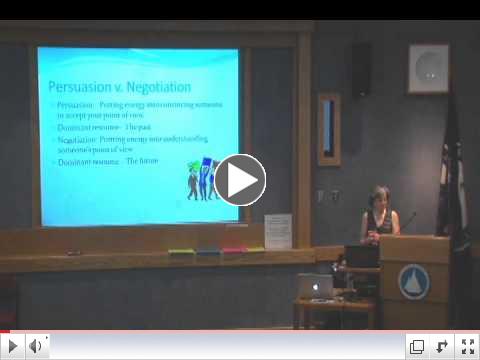Conflict Resolution Newsletter
by Alternative Resolutions, LLC
March 2013 - Vol 3, Issue 3
|
|
|
|
Quick Links
 | | Negotiation Tips |
| |
|
| New website feature: our prior newsletters are now available on our website!!! |
|
Company News and Recent Publications | |
Coming soon...
Negotiation Primer
Email us for a copy.
Just published...
Newly revised fact sheet
The High Cost of Conflict Email us for a copy.
New roster...
Ellen Kandell was recently approved to join the mediator list for Montgomery County Circuit Court custody disputes.
Check out our recent radio interview on mediation and dispute resolution. To listen click here.
|
|
|
|
Greetings! | |

The new model of leadership in the twenty-first century embraces the characteristics of a mediator according to Mark Gerzon, Leading Through Conflict: How Successful Leaders Transform Differences into Opportunities, Boston, MA: Harvard Business School Press, 2006. Print.
This month we discuss integral vision and systems thinking. "If integral vision is the goal, systems thinking is the map". As a mediator I see the characteristic of integral vision as the eternal optimism that I bring to each case. I look at a case from a systems approach, so settlement possibilities emerge that parties, often stuck in their narrow perspective, can't envision on their own. |
The Whole is Greater than the Sum of its Parts | |
Integral Vision
By integral vision we mean looking at the conflict from a large scale macro type perspective. Mediators stand for possibility of a solution, where the individuals, companies or countries can't imagine one.
Developing the capacity and skill of integral vision is a continual learning process. We naturally see things as separate. Everyone comes with their own unique thoughts, feelings, and world view. We are born into families, cultures, countries that have boundaries and define us as separate groups. To have integral vision means to develop enormous capacity for compassion and seeing multiple views. It's like a mountain climber at the peak, who looks down and sees the craggy landscape of the earth, no state or territorial borders are visible. "Integral vision means understanding divergent worldviews but not being limited by or trapped within them. Fear is the greatest enemy of integral vision". When we're trapped by fear we respond with stereotypes. A leader operating with stereotype visions can't have integral vision.
Leaders demonstrating integral vision need to ask broad questions. Long term needs must be the drivers. They need to provide clear direction and motivation to change. As a leader or manager, develop the sensitivity to language so that your words don't communicate an either-or perspective but a wide open panorama.
Systems Thinking
Systems thinking means identifying all of the significant elements related to the conflict and understanding the relationship between them. This means thinking beyond one's own narrow interests. It means considering the other side's viewpoint and even expanding the scope of the problem or conflict to consider other stakeholders who might be involved. This mediator skill of systems thinking mirrors one of the problem solving negotiation steps of distinguishing interests from positions. Fisher, Roger, William Ury, and Bruce Patton. Getting to Yes: Negotiating an Agreement without Giving in. London: Random House Business, 1999. Print.
In an increasingly interdependent world a conflict that effects one department, team or company is likely to impact another. If we look at a problem from a systems perspective, we have the possibility of expanding beyond our parochial self serving interests. Systems thinking means out of the box thinking.
If we use a systems thinking approach we will begin to see and hopefully understand perspectives of each other differently. It doesn't have to be complex.
What happens if we don't use systems thinking? Parties resort to oversimplified explanations of the problem which often demonize or marginalize the issues of the other side. What is currently happening in the U.S. Congress is a prime example.
Be careful not to let an us versus them mentality start interfering with a broader take on the problem or conflict.
Next month: Leadership Presence |
|
|
|
|
Theory Application TIPS
| |
TIPS for strategic thinking and integral vision about conflict:
- Keep it simple
- Think systemically about your own role
- Become aware of your own biases and blind spots
- View the problem as if from outside
- Step into the shoes of "the other"
-
Be conscious of language and word choice
-
View the problem from a higher vantage point
Do you have questions about this month's article? We'd like to hear from you Email us now!
|
|
Conflict Resolution in the Community: Upcoming Events | |

Basic Mediation Training, June 5-7 and 19-20, 2013. Maryland State Bar Association, Ellicott City MD. Registration opens early April.
April 9, 2013 American Society of Appraisers, Arlington VA
April 25, 2013 Frederick County Society of Human Resource Managers, Frederick MD |
|
We look forward to being your partners in productive, proactive conflict resolution endeavors. If you are a new reader or didn't request a copy previously please email us for a free copy of our organizational needs assessment. Put your organization in a conflict healthy environment.
Sincerely,
Ellen |
|
Ellen F. Kandell, Esq.
Alternative Resolutions, LLC
|
|
|
|
|